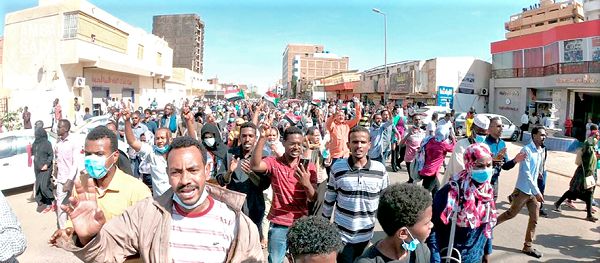
Will Sudan’s ‘Arab Spring’ topple al-Bashir?
On December 19, 2018, the people of Sudan hit the streets to protest against high rise of bread and fuel prices but the demonstrators quickly turned their attention to other issues and are now demanding the resignation of President Omar Hasan al-Bashir.
The protests, which have been taking place almost every day since it started, is similar to the 2010 Arab Spring uprising that rocked several Arab countries and toppled strong African leaders, notable among them Libya’s Muammar al-Qathafi and Hosni Mubarak of Egypt.
The current situation in Sudan has been described as the longest in decades and the most significant in Sudan's recent history.
Deaths
Low economic growth and President Bashir’s long stay in power are among other issues fuelling the anger of many Sudanese.
The anti-government protests have spread to at least 35 cities and villages as professionals and marginalised young people pile more pressure on the government to resign.
The government’s response has been ruthless — a crackdown by security forces has left at least 30 people dead according to government official report, but Rights groups put the total at more than 50.
At least five reporters are reported to have been detained by the national intelligence security services and are being held at undisclosed locations. Sudan has long had a poor reputation for media freedom and the country is ranked 174th out of 180 countries where press freedom is curtailed.
Economic meltdown
In 2010, Sudan was considered the 17th-fastest-growing economy in the world and saw rapid development largely from oil profits even though it was facing international sanctions.
Because of the secession of South Sudan, which harbours over 80 per cent of Sudan's oilfields, Sudan entered a phase of stagflation.
Months before the protests, Sudanese were struggling to make ends meet and this led the government to introduce reforms by devaluing the Sundanese pound and lessening import restrictions, which never had any significant effect.
Critics of President Bashir blamed him for the economic meltdown that saw inflation rising to 72 per cent by the end of 2018.
According to them (critics), the country had been marginalised by his governance style and the situation made it impossible for the country to pay for food imports.
Nahla Mohaka, a Sudanese film-maker and writer, told the BBC last year that everybody was feeling the financial pinch.
"Normally, there would be a meat dish, but meat had become very expensive. And even the fuul (a bean stew with onions), before this would have been about 10 Sudanese pounds ($0.56; £0.42), now it is 50 or more," Ms Mohaka said.
The President’s supporters, however, blame a Western conspiracy designed to undermine Islamist rule in Sudan.
US sanctions
Sudan has for a long time been targeted by economic sanctions by the United States of America over the 2003 Darfur conflict and related human rights abuses.
The sanctions halted any transactions using US currency or products. What it means, therefore, is that any business which operated in the US was not able to trade with Sudan.
For years, international banks would not operate in Sudan, and the state and companies were largely unable to get spare parts for things such as aeroplanes or vital health equipment.
But even as the sanctions were lifted two years ago, the country has still not regained its footings and the economy has been falling off a cliff, with the hope of an improved economy failing to materialised.
Darfur legacy and ICC
In February 2003, the Sudan Liberation Movement (SLM) and the Justice and Equality Movement (JEM) rebel groups began fighting the Bashir government which they accused of oppressing Darfur's non-Arab population.
The war, nicknamed the Land Cruiser War, claimed the lives of an estimated 300,000 people and displaced over two million.
So brutal was the conflict that it was referred to by international commentators as ethnic cleansing and population clearance; in short, a genocide.
The United Nations, rights groups and some Western countries, particularly the US, took a strong stance against Bashir’s government’s brutal response to the violence.
Bashir would eventually be indicted years later by the International Criminal Court (ICC) for crimes against humanity and for having facilitated and ordering the genocide.
These charges have come to define his legacy.
Way forward
From all indications, the ongoing protest is mimicking signs of an Arab Spring and observers are closely monitoring if al-Bashir’s declaration in November 2003 that “those who are waiting for the Arab Spring to come to Sudan will still have to wait a while.
Already, President al-Bashir has conceded many flaws in his administration and for which reason he is willing to reform.
What Sudan needs now is a comprehensive reform that will improve the economy.
Skyrocketing inflation and unemployment rates need to be addressed even in the face of harsh Western economic sanctions.
Separation of powers, individual rights, rule of law, freedom of speech and the media are fundamental democratic principles desperately needed to for a new Sudan.
According to a Human Rights Watch report, Sudan’s human rights record continued to be defined by government repression and violations of basic civil and political rights, restriction of religious freedoms, and disregard for obligations on civilian protection under international humanitarian law.
The contributions of the opposition and civil society organisations are needed for a better Sudan, otherwise, al-Bashir’s days are numbered.
• Writer’s email:
